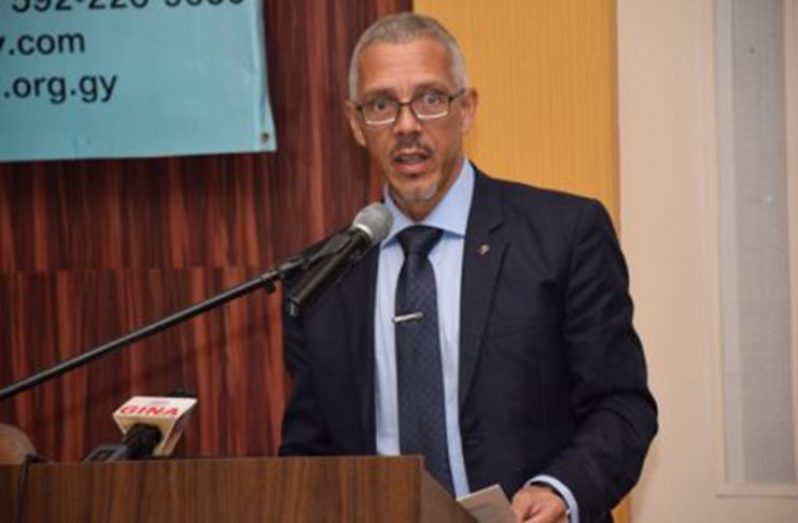EVEN with the recent reductions in fuel prices, Minister of Business Dominic Gaskin and the United Minibus Union (UMU) have agreed that a new enforceable fare structure for standardisation in the minibus sector is required.
Just last week, the Guyana Oil Company Ltd (Guyoil) announced price reductions for gasoline and gas oil following a recent fuel hike which saw several minibus operators increasing their fares.
However, even with this reduction, there are still concerns about some minibus operators and whether they will reduce their fares in light of the recent change.
Speaking the topic, UMU President Eon Andrews said: “Those operators found that commuters had no choice but to pay because they wanted to get to work and back home…they tried a thing and it appears to be working. They will be very reluctant to revert to the old fare price until they are forced to do so through a joint press release by the Government and UMU which gives commuters the support to resist exploitation.”
Minster Gaskin in an interview with the Guyana Chronicle said that such an issue proves why ongoing deliberations between the Government and the Union on the challenges within sector are important.
“That is why is important that we have an agreement between the United Minibus Union and the Government so that once we have the agreement and we both respect the agreement, I think it will force the others to come on board but as long as some of the operators feel that things are in flux and there is nothing that is agreed upon, they’re going to set their own prices,” Gaskin said.
Andrews nonetheless commended GuyOil’s decision but reminded that other matters, apart from fuel costs, are also being addressed.
“GuyOil’s press release that it will be reducing its fuel prices for customers is very commendable. The United Minibus Union expected such an action and was not surprised since such decisions are what responsible Governments do to assist its citizens.
“Whether it’s enough to bring relief to minibus drivers and conductors is another matter. We still have to address the other operational costs that had been there since 2008,” he said.
On the topic, Gaskin said that the Ministry awaits additional information from the UMU which will facilitate an analysis of the cost of operating a minibus versus the fares received and whether there is need for an increase.
“Because we want the minibus business to be viable we don’t want them to be forced to stuff 20 people in a bus just to make a living. So, we want to set a reasonable fare and agree upon it and then once we can arrive at a figure we’ll take it to Cabinet. If Cabinet approves it we’ll take it to the minibus union and if they are in agreement then that becomes the new fare structure and that is put out to the public along with some means of enforcement,” he said.
“I don’t know yet how we are going to enforce it but there is a licensing body and maybe we’ll have to look at the terms and conditions on which the licenses are granted so we can’t have five different buses running the same route and everyone putting a different fare. That is not fair on the consumers,” the Minister said.
In addition, Gaskin took the opportunity to elaborate on discussions between the UMU and the Ministry about the introduction of mandatory training in the sector.
He said that there are several existing factors which continue to discourage persons form travelling by minibuses and, as such, the Government is willing to provide assistance to address this through training in hospitality.
“They were looking on whether there can be some sort of hospitality training because the service that they [minibus operators] provide is an important service and they need to understand that. Some of them do, some of them don’t but all of them need to understand. A lot of people don’t take buses not because they don’t want to sit down next to any and anybody but because the service is really not up to scratch.
“Things like the music, things like the cleanliness of the bus, things like the speeding, the way they talk to customers, they ways of collecting fares and giving back change, a whole lot of things need to be put in place and it requires training and sensitisation and we’re prepared to help where that is concerned,” he said.
In the next month, the UMU and the Business Ministry are set to meet again to continue discussions on these matters and more towards the improvement of the sector.



.jpg)








